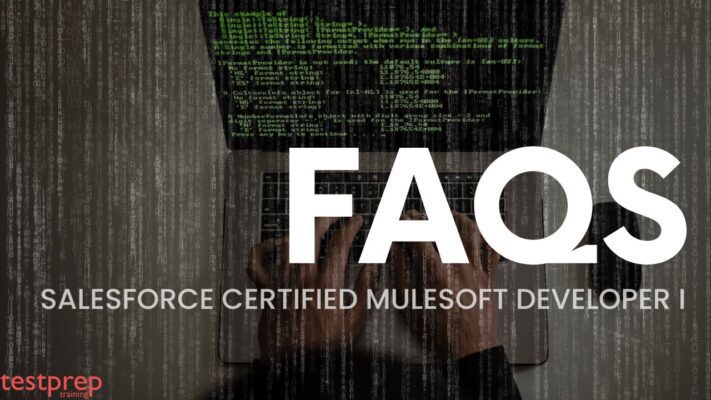Salesforce Certified MuleSoft Developer I
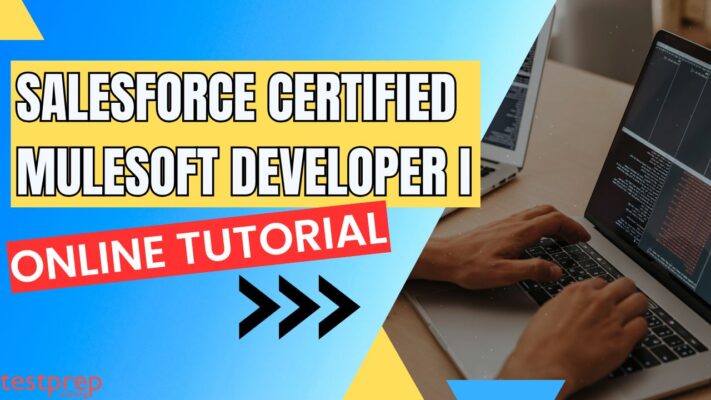
The Salesforce Certified MuleSoft Developer I certification is intended for individuals with hands-on experience handling basic Mule 4 projects under guidance and supervision. This certification equips candidates with the skills to design, develop, test, troubleshoot, deploy, and manage fundamental APIs and integrations, seamlessly transitioning between Anypoint Platform and Anypoint Studio. Earning the Salesforce Certified MuleSoft Developer I credential is mandatory before pursuing the Salesforce MuleSoft Developer II certification.
Knowledge Required
Salesforce Certified MuleSoft Developer I candidates have the knowledge, skills, and experience to:
- Utilize MuleSoft’s Anypoint Platform to manage every phase of an API’s lifecycle, including design, development, deployment, management, and governance.
- Use Anypoint Studio to create, test, and debug basic integrations and API implementations.
- Connect to various resources such as databases, files, web services, SaaS applications, and JMS queues.
- Perform data transformations with DataWeave 2.0.
- Manage event flow and handle errors.
- Process batch records.
However, candidates for this exam are not expected to:
- Develop production-ready Mule integrations within a DevOps environment.
- Expose production-ready APIs managed by Anypoint Platform from Mule applications.
- Build maintainable and modular Mule applications along with their Maven builds.
- Create monitorable Mule applications.
- Develop performant and reliable Mule applications.
- Secure data at rest and during transmission.
Exam Target Job Roles
Common job roles for Salesforce Certified MuleSoft Developer I candidates include:
- Developer
- Architect
- Administrator
Exam Details
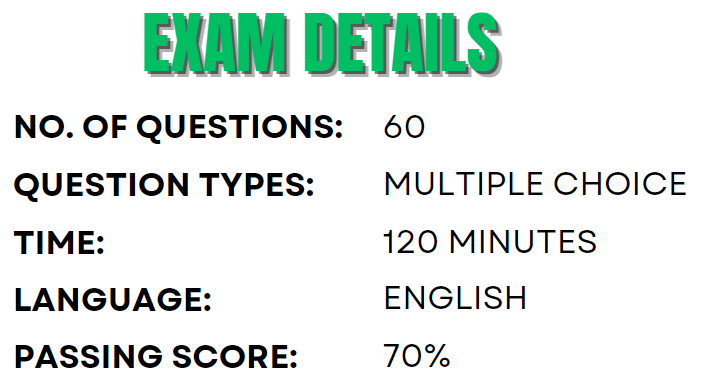
The Salesforce Certified MuleSoft Developer I exam consists of 60 multiple-choice questions and up to five non-scored questions, with a 120-minute time limit that accounts for unscored items. A passing score of 70% is required. The exam can be taken in a proctored setting, either at an authorized testing center or online. No hard-copy or online reference materials are permitted during the exam.
Course Outline
The Salesforce Certified MuleSoft Developer I exam evaluates a candidate’s expertise in several key areas. Candidates should have hands-on experience with basic Mule 4 projects under supervision and an understanding of fundamental integration principles and API-led connectivity concepts. Additionally, candidates should be familiar with the components and advantages of the Anypoint Platform for system integration and API management. However, the exam topics include:
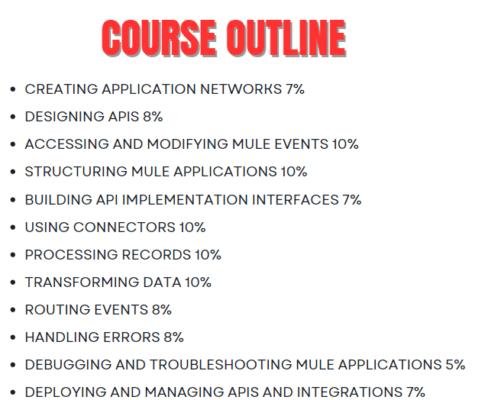
– Creating Application Networks 7%
- Identify core architectural concepts of the Application Network and modern APIs.
- Identify features of an API-led approach.
- Identify features of MuleSoft’s recommended Operational Model (C4E).
- Apply correct processors/syntax and predict outcomes to consume RESTful web services (RAML-based).
– Designing APIs 8%
- Use REST API methods and resources.
- Define REST API parameters and responses.
- Call RESTful services defined by RAML syntax.
– Accessing and Modifying Mule events 10%
- Apply correct processors/DataWeave expressions to access and modify Mule event payloads, and predict outcomes.
- Apply correct processors/DataWeave expressions to access and modify Mule event attributes, and predict outcomes.
- Apply correct processors/DataWeave expressions to access and modify Mule variables, and predict outcomes.
- Apply correct processors/DataWeave expressions to enrich Mule events using Mule 4 connector targets, and predict outcomes.
– Structuring Mule Applications 10%
- Specify when and how to structure Mule applications into separate configuration and properties files, and predict outcomes.
- Specify when and how to pass events between flows and subflows using connectors and flow references, and predict outcomes.
– Building API Implementation Interfaces 7%
- Manually build API implementations from an API specification, RAML or not.
- Predict the results of APIkit based upon a RAML specification.
- Implement correct responses based on a RAML specification, either manually or with APIkit.
– Using Connectors 10%
- Apply correct processors/syntax to connect to databases, and predict outcomes.
- Apply correct processors/syntax to connect to files or FTP servers, and predict outcomes.
- Apply correct processors/syntax to retrieve and combine data in the middle of a flow, and predict outcomes.
– Processing Records 10%
- Apply correct processors/syntax to process individual records in a collection using For Each scopes, and predict outcomes.
- Apply correct processors/syntax to process individual records in a collection using batch scopes, and predict outcomes.
- Apply correct processors/syntax to process individual records in a collection using async scopes, and predict outcomes.
- Apply correct processors/syntax to process individual records in a collection using DB listeners, and predict outcomes.
- Apply correct processors/syntax to process individual records in a collection using messaging queues, and predict outcomes.
- Apply correct processors/syntax to persist data between flow executions.
– Transforming Data 10%
- Convert between output types and data types using DataWeave.
- Predict the result of core DataWeave functions.
- Apply correct syntax to write DataWeave transformations to coerce, format, order, and filter data, and predict outcomes.
- Call Mule flows from a DataWeave script.
- Define, use, and reuse DataWeave modules, functions, and variables, and predict outcomes.
– Routing Events 8%
- Apply correct processors/syntax to route messages using DataWeave conditions within a choice router, and predict outcomes.
- Apply correct processors/syntax to scatter and gather messages, and predict outcomes.
- Apply correct processors/syntax to validate Mule events, and predict outcomes.
– Handling Errors 8%
- Apply correct processors/syntax to implement global error handlers, and predict outcomes.
- Apply correct processors/syntax to implement on-error continue and on-error propagate handlers, and predict outcomes.
- Apply correct processors/syntax to combine multiple error handlers, and predict outcomes.
- Apply correct processors /syntax to implement try scopes, and predict outcomes.
- Apply correct processors/syntax to map custom errors, and predict outcomes.
– Debugging and Troubleshooting Mule Applications 5%
- Apply correct MUnit processors to implement basic automatic tests for Mule applications, and predict outcomes.
- Identify root causes for errors when debugging Mule applications, and predict outcomes.
– Deploying and Managing APIs and Integrations 7%
- Deploy applications to CloudHub.
- Manage APIs using separate proxies and auto-discovery.
- Manage API policies.
Salesforce Certified MuleSoft Developer I: FAQs
Salesforce Exam Candidate Code of Conduct
By participating in the Salesforce Credentialing Program, you agree to comply with the terms outlined in the Salesforce Credential and Certification Program Agreement.
As a participant, you are expected to:
- Use official Salesforce study materials available on Trailhead, such as exam guides, trail mixes, and Trailhead courses, to prepare for your certification exams.
- Engage with the Trailblazer Community for additional training, peer collaboration, and to connect with study groups or mentors.
- Adhere to the rules governing both online proctored and in-person certification exams.
- Report any actions that may compromise credential security to the Credential Security team.
Participants in the Salesforce Credentialing Program are strictly prohibited from:
- Sharing, using, or seeking out certification exam questions, answers, or superbadge solutions.
- Requesting or providing assistance during certification exams.
- Engaging in any behavior that violates the Salesforce Credential and Certification Program Agreement.
Violating the Program Agreement can lead to:
- Cancellation of scheduled exams.
- Suspension from online proctored exams.
- A ban from participating in future certification exams.
- Revocation of current certifications and superbadges.
- Removal from the Salesforce Credentialing Program and the Trailblazer Community.
Salesforce Certified MuleSoft Developer I Study Guide
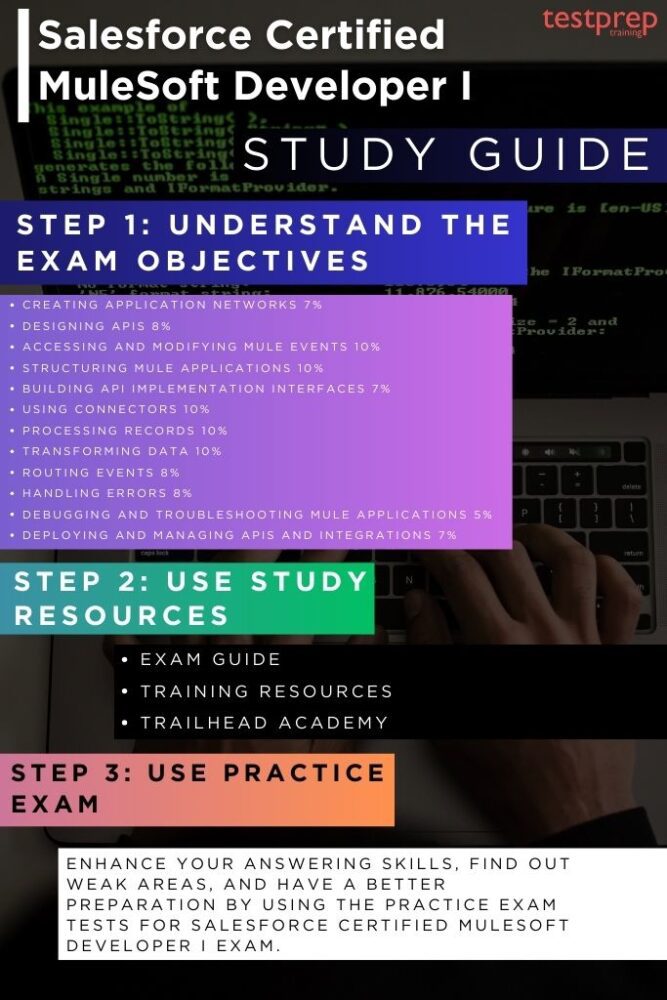
1. Understand the Exam Guide
The Salesforce exam guide is a valuable resource designed to help you assess your readiness for the Salesforce Certified MuleSoft Developer I Exam. It offers detailed information about the ideal target audience for this certification, including the necessary skills and experience. The guide outlines recommended training materials and official documentation that will support your preparation, along with a comprehensive list of exam objectives, all aimed at helping you achieve a passing score.
Salesforce strongly encourages a well-rounded approach to exam preparation, which includes a blend of hands-on experience, attending relevant courses, and self-directed study. By combining practical knowledge with formal training and independent learning, you can significantly enhance your chances of successfully passing the exam.
2. Use Recommended Training and Resources
It is recommended to combine hands-on experience, completion of training courses, relevant Trailhead trails, and self-study in the topics covered in the Exam Outline section of this guide. For self-study, the following materials are suggested:
- Course-Inspired Trailmixes:
- Practice Exam: The Salesforce MuleSoft Developer I Practice Exam is a valuable resource to help you get familiar with the format and question types you will face in the actual exam.
- The questions are designed to reflect the style and difficulty of the real exam, and self-scoring will allow you to pinpoint your strengths and areas that need further study, helping you focus your preparation more effectively.
3. Utilize Salesforce Trailhead Academy
Utilizing Salesforce Trailhead Academy for preparation for the Salesforce Certified MuleSoft Developer I exam offers an effective and engaging way to enhance your knowledge and skills. Trailhead Academy provides a comprehensive suite of resources, including interactive courses, hands-on projects, and guided learning paths specifically tailored for MuleSoft certification. By participating in these structured learning modules, you can build a solid foundation in key concepts such as API-led connectivity, data integration, and the features of the Anypoint Platform.
The academy’s courses are designed to cater to various learning styles, combining theoretical knowledge with practical applications. Additionally, the Trailhead Academy offers courses for this exam. This includes:
– Anypoint Platform Development: Fundamentals (DEX401)
The Anypoint Platform Development: Fundamentals course provides essential training on managing APIs with the MuleSoft Anypoint Platform and creating API applications using Mule 4 and Anypoint Studio. Participants will gain a foundational understanding of development on the Anypoint Platform over the course of five days in an instructor-led format, focusing on API management and the creation of Mule applications.
Who should enroll in this course?
This intensive and information-rich course is for developers and architects tasked with building APIs and integrations on the Anypoint Platform. Candidates should have prior experience with an object-oriented programming language, a basic grasp of data formats such as XML, CSV, and JSON, and foundational knowledge of common integration technologies, including HTTP, Java Message Service (JMS), Java Database Connectivity (JDBC), REST, and SOAP. This course is also an excellent option for individuals aiming to achieve their MuleSoft Developer I certification.
4. Become Part of Study Groups/Communities
Becoming a part of study groups and communities is a highly beneficial strategy for preparing for the Salesforce Certified MuleSoft Developer I exam. Engaging with peers who share similar goals creates a supportive environment where you can exchange knowledge, resources, and insights. These groups often consist of individuals at various stages of their MuleSoft learning journey, allowing for a diverse exchange of ideas and experiences.
Participating in study groups provides opportunities for collaborative learning, where members can discuss challenging topics, share study materials, and clarify doubts. Many groups also organize mock exams or practice sessions, helping participants familiarize themselves with the exam format and question types. Additionally, being part of a community can motivate you to stay on track with your study plan, as you can set goals and hold each other accountable.
5. Take Practice Exam Tests
Taking practice exams is an essential component of preparing for the Salesforce Certified MuleSoft Developer I exam, as it allows you to assess your understanding of the material and familiarize yourself with the exam format. These practice tests simulate the actual exam environment, featuring questions that mirror the style and difficulty level of the official certification exam. By regularly taking these assessments, you can identify areas where you excel and pinpoint topics that may require further study, helping you focus your preparation efforts more effectively.
Furthermore, practice exams also help build your confidence and improve your time management skills, as you learn to navigate through questions within the allotted time. Many practice tests provide instant feedback and scoring, enabling you to track your progress over time and adjust your study strategies accordingly. Additionally, they often include explanations for correct and incorrect answers, offering valuable insights into the reasoning behind each question.


